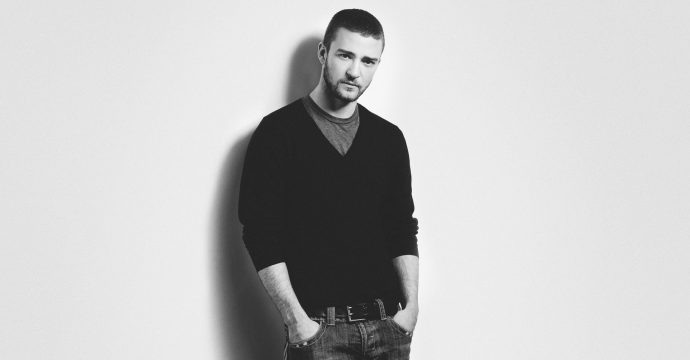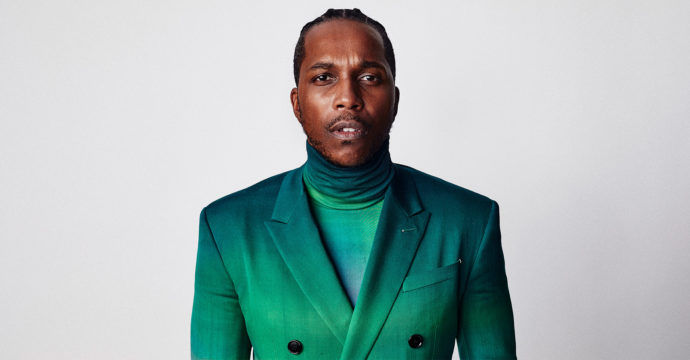
Mr. Timberlake, have you had your quarter-life crisis yet?
Quarter life crises are so last generation. (Laughs) I’ve never thought about it, but I can tell you that this year of my life has been the most different. I feel like I’ve learned so much every year since I turned 25. I feel like that was a turning point for me.
Why?
I just made this conscious decision to appreciate what I do have and not wanting what I don’t have. That way I feel like you’re able to pack in more memories. I feel like each year of my life since I turned 25 I’ve had so many more memories.
You certainly made a lot of memories before then too…
… I don’t remember anything before 25. (Laughs)
People are freaking out about their age earlier and earlier these days, some even starting Botox in their twenties.
(Laughs) I’m just trying to imagine Botox at 25.
I’ve heard it’s very normal in Hollywood.
It is. From my understanding, they do it so that when they get older it doesn’t look like such a shift. It’s more so that in the future they can hide that they had plastic surgery. They’ll start doing Botox early so that their skin stays tight until they’re 35 and then they’re 40 and then you never question when their skin looks older and then all of a sudden it looks completely different. It’s so that they can hide it more.
For some people it’s as normal as brushing your teeth.
Well, dental hygiene... I think that’s different.
Of course it is.
That’s like taking a bath, that’s not paying somebody for Botox.
Maybe it has to do with the wish for immortality. How important is that in your work, that it might last long after you’re dead?
I think the only way to achieve something that’s classic is to be in the moment. You don’t sit around and think, “Oh, I hope this is remembered forever!” You just have to be honest and I think that requires being in the moment. I don’t think you can worry about what is going to happen with something after that. I think the only thing that you can do is be honest and let the chips fall where they may.
"At the end of the day, we’re just actors and musicians and I don’t think we’re saving the world."
When did you learn that?
Playing concerts and touring is very much about creating a moment. I think making music is about being in the moment as well. Being in the moment to me is more about when you don’t have to analyze what it is that you’re doing, when it just feels right. I think you find the same moments in acting, when you don’t have to go back and think about it. You don’t have to ask as many questions when you know what you felt when you were in the moment portraying that character.
Is that why a lot of people don’t enjoy watching themselves on screen?
Yeah, because then all of a sudden you’ll start judging it yourself and that’s not why you did it. To me, that’s not what any type of art is. I find it interesting that art gets judged, that some sort of price gets put on it. Honestly, there are a lot of similarities to that part of the industry and the way we classify people by how wealthy they are. How struggling can you be as an actor? How real can your music make me feel? I don’t know… My last album wasn’t real at all.
And that doesn’t bother you?
I’m not trying to compare myself to someone who’s as brilliant as John Lennon so please don’t write this like that…
I can’t make any promises.
If you do I’ll come find you. And stab you. (Laughs) But I never felt more vindicated than when I watched the movie Imagine and there’s this moment where a guy shows up on Lennon’s doorstep and says, “You wrote that song to me.” And Lennon is like… his reaction made me laugh. He’s like, [with mock English accent] “No, man. I take words and put them together. They don’t mean anything to me. I didn’t write that song to you… Now do you want something to eat?” When you take the pressure off of it… at the end of the day, we’re just actors and musicians and I don’t think we’re saving the world.

Mr. Odom Jr., looking back, which of your roles has had the greatest impact on your perspective as an actor?
I think with Hamilton, there was something that I suspected about myself: I just thought that I was capable of more than I’m being asked to do in this business. As I watched my white brothers and sisters rise up the ladder, I was happy for them but I felt like if I was given a shot I could do something, if I was allowed to do more than just what I’m being asked to do in the margins — because we are constantly pushed into margins. So, Lin brought us all into the room and asked the most of us, and we got to prove to ourselves what we were capable of. Leaving that show, I would never again have to ask myself if I was capable of something great. I know now, if I’m given the material and the resources, if I’m given the opportunity, I can do something great too.
Does knowing what you’re capable of also make it easier to say no to the roles that aren’t right for you — or have you made some tough decisions over the years?
It’s not tough for me. That’s your integrity. I tell that to young people, you don’t sell yourself out, you don’t sell yourself short, you don’t sell your people out for anything, even if it means some hungry nights for a bit. You’ll make mistakes, we all make mistakes, and film is a great gamble. You don’t know when you accept a film! Sometimes it doesn’t work, and it’s a miracle when it does. But you can’t go in knowingly taking something that you think is going to be damaging or detrimental to your people, not for anything. So that’s not hard.
“There’s been such a lockout for so long about people being at the helm of telling the stories of their own lived experiences; let us be in charge.”
Still, sometimes you simply have to put food on the table, right?
Yeah. But you figure, we are creatives and so yes, there’s choices that you make for lots of different reasons. But it’s very easy to walk away if I think that the part is some sort of caricature or something that I do not think is true or that my voice won’t be respected when I tell them this is not true to my lived experience or anyone else’s that I know. If I think those things won’t be respected, that’s a very easy pass. I think that’s part of what’s beautiful about a film like One Night in Miami being directed by Regina King.
What do you mean?
Well, there’s been such a lockout for so long about people being at the helm of telling the stories of their own lived experiences, whether that’s with gender or race; let us be in charge. So to have Regina at the helm of that meant a lot. Especially because in many ways, Sam Cooke has been one of my teachers for my whole life. I’ve listened to plenty of Sam Cooke, never did I imagine or intend to play him in anything. But that’s what he meant to me, I really just looked at him almost as you would look at a mentor. If you are singing stuff from the church, if you are a black man singing soul or R&B or pop, Sam Cooke is the blueprint.
That must have been a daunting role to play when there’s so much to live up to.
Are you kidding me? Very. Yes, I ran from this project for as long as I could, for as long as my representation would allow me to! They told me to take a look at the script again after I kept running from it, and I looked at it again and I saw what they saw. Sam was also inside Regina in a certain way. She was offering me something that sent me down a path that was more truthful, more entertaining, more interesting always.
As a trained singer who has spent years working on Broadway, did you ever feel boxed in by those experiences when you made the transition to film?
That is a real thing, and through the years, it is a thing that is sort of a stench that I haven’t shaken. There’s plenty of stage actors that we can point to over the years that excel as storytellers, and their training has prepared them for that. You want to use your whole body, everything you have to help tell the story in the most effective way. And I’m just grateful to my teachers, I’ve had some great training at Carnegie-Mellon University. My classmates at Carnegie, I was there at the same time as Joe Manganiello, Matt Bomer, Josh Gad, Josh Groban, Zachary Quinto… A lot of those guys that I just mentioned were musical theater actors, and they are only known for acting right now. So our training was really about making sure that the story was always first.
“It’s an intense time. You make it, you insulate yourself to tell that story, and then you let it go.”
Is it difficult to juggle your life as an actor with your life as a musician and recording artist?
It’s very difficult to juggle. But I love the variety and I finally found a team of people to work with that understand that about me, so I let them worry about my calendar. (Laughs) The variety is very important to me and in a weird way, it makes them stronger. Going off to shoot a movie makes me better when I’m in a studio, doing a play, off-Broadway or on-Broadway, is going to make me better when I go make a television show — so we have to make room for all of it.
Do you have the headspace to do all of that at once? Are you, for example, working on songwriting at night after shooting a film?
I try not to! That’s the one thing I can’t do. That’s another reason why the schedule is so important: things need to be protected. When I was doing One Night in Miami, that was all that I did. I can’t really audition for anything else, I can’t be preparing for something else at the same time, it really is a deep dive. That’s another reason why I am so excited at the end of any project to let it go, because it’s an intense time. You make it, you insulate yourself to tell that story, and then you let it go.